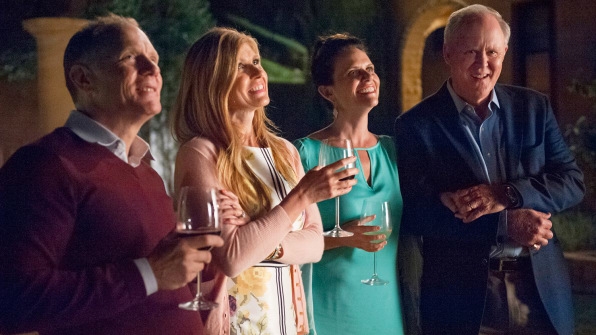Imagine you’re at a dinner party and, unbeknownst to you, Donald Trump has been invited as well. Do you:
A) Hold your tongue for the sake of dinner-party etiquette?
B) Try to have a civilized conversation with him?
C) Hurl at him every curse word known to man–and several new ones made up on the spot as a byproduct of white-hot fury?
D) Just leave?
In director Miguel Arteta’s latest film Beatriz at Dinner, the title character opts for pretty much all of the above.
Beatriz at Dinner doesn’t involve Trump, per se. However, Beatriz (Salma Hayek) is a homeopathic healer whose sensitivity and empathy toward the world around her runs in direct conflict with the night’s guest of honor Doug Strutt (John Lithgow), a real estate tycoon whose casual racism is just a base coat to his brash, 1% viewpoint of the world.
“Our goal with Beatriz was to make a story of our very divided culture having a chance to talk and what that would look like,” Arteta says. “We’ve all been trapped at a dinner party with someone we disagree with. In a way, it’s a fantasy of what it would be like for two people who would never have a chance to debate each other, to debate each other.”

In the film, Beatriz and Doug square off against issues that are clear reflections of real world problems: commercial development bulldozing natives out of their land, hunting endangered species, and a gross negligence of the environment. Even if the rest of the dinner party guests are against Doug’s convictions, no one is willing to call him out on it. What adds to the tension of the story is the fact that Beatriz is of an entirely separate social class than everyone else, particularly Doug. So when she’s the only one who challenges him, her arguments are that much more passionate because they’re rooted in lived experiences.
“If people watch Beatriz at Dinner and they say, ‘I know what it’s like to feel like there are powerful people making decisions that affect me,’ I think that recognition energizes you to know that you’re not crazy and to know that if it’s time for you to speak up, you’re not alone,” Arteta says. “Stories that reflect the frustrations we’re experiencing as human beings help us have a stronger voice when you have to go and talk to other people about it, or get up and vote, or speak truth to things in your life.”

As inspirational as that sounds, Beatriz at Dinner takes a hard left away from sunny optimism toward a surprisingly dark ending. For all the tension and awkwardness between the main characters, Beatriz at Dinner has a relatively comedic feel to it–that is, until the third act of the film when a breaking point is reached. It’s an ending that some may find hard to digest, but, according to Arteta, it couldn’t end any other way.
“The ending is highly debated because we took an approach of reflecting the frustrations we feel of how the wrong forces are winning in this world. To try to have a hopeful ending, people would’ve thought it was bogus,” Arteta says. “I don’t have the answer of what’s the best way to change this avalanche of what’s been taking over lately. It’s hard and it does seem hopeless at times.”

“We invite the audience to think about what the movie is talking about which is the frustration of the direction that our world has gone,” Arteta continues. “Why are our priorities so out of whack? Hitting the balance of entertaining and thought-provoking intention is really hard, but I think we’ve done pretty good job.”
Director Miguel Arteta’s new film “Beatriz at Dinner” pits the working class against the one-percent, with a surprisingly dark (but necessary) ending.
Imagine you’re at a dinner party and, unbeknownst to you, Donald Trump has been invited as well. Do you:
Fast Company , Read Full Story
(51)